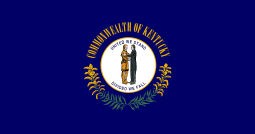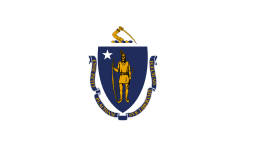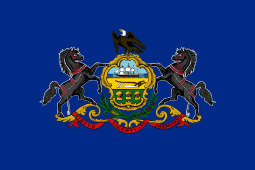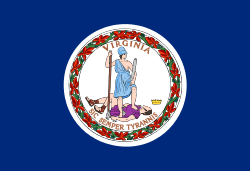Commonwealth (U.S. state)

Commonwealth is a designation used by four of the 50 states of the United States in their full official state names:
- Commonwealth of Kentucky,[1] (Kentucky was originally part of the land grant of the Colony of Virginia.)
- Commonwealth of Massachusetts,[2]
- Commonwealth of Pennsylvania,[3]
- Commonwealth of Virginia.[4]
Each was, prior to 1776, a British colony, or parts thereof, and share a strong influence of English common law in some of their laws and institutions.[5][6]
The term "Commonwealth" does not describe or provide for any specific political status or legal relationship when used by a state.[7] Those that do use it are equal to those that do not. A traditional English term for a political community founded for the common good, it is used symbolically to emphasize that these states have a "government based on the common consent of the people"[8] as opposed to one legitimated through their earlier colonial status that was derived from the British crown. It refers to the common "weal", or welfare, of the public[9] and is derived from a loose translation of the Latin term res publica (cf. the 17th-century Commonwealth of England).
Besides the four aforementioned states, other states may also, on occasion, use the term "commonwealth" to refer to themselves. Vermont, for instance, uses the term "commonwealth" three times in its constitution, interchangeably with the term "state".[10] Also, while Delaware was primarily referred to as a "State" in its 1776 constitution, the term "Commonwealth" was also used in one article within it.[11]
Two U.S. territories are also designated as commonwealths: Puerto Rico and the Northern Mariana Islands. When used in connection with areas under U.S. sovereignty that are not states, the term broadly describes an area that is self-governing under a constitution of its adoption and whose right of self-government will not be unilaterally withdrawn by the United States Congress.[7]
Commonwealth of Kentucky
On September 28, 1786, the residents of Kentucky County began petitioning the Virginia legislature for permission to become a "free and independent state, to be known by the name of the Commonwealth of Kentucky". On June 1, 1792, Kentucky County officially became a state. As in Virginia, the official title of the elected local prosecutor in each of Kentucky's political subdivisions is the "Commonwealth's Attorney," as opposed to State's Attorney in other States or the more standard District Attorney. Kentucky is the only state outside of the first 13 that uses commonwealth in its name.
Commonwealth of Massachusetts
Massachusetts is officially named "The Commonwealth of Massachusetts" by its constitution. The name "State of Massachusetts Bay" was used in all acts and resolves up to 1780 and the first draft of the constitution. The current name can be traced to the second draft of the state constitution, which was written by John Adams and ratified in 1780.[12]
In Massachusetts, the term State is occasionally used in an official manner, but usually in a compound structure rather than as a stand-alone noun. This is evident in the name of the agency "Massachusetts State Police," the Massachusetts State House and in "Bridgewater State Hospital".
Commonwealth of Pennsylvania
The Seal of Pennsylvania does not use the term, but legal processes are in the name of the Commonwealth and it is a traditional official designation used in referring to the state. In 1776, Pennsylvania's first state constitution referred to it as both "Commonwealth" and "State", a pattern of usage that was perpetuated in the constitutions of 1790, 1838, 1874 and 1958.[13] One of Pennsylvania's two intermediate appellate courts is called the "Commonwealth Court".
A detailed history describing the origins of Pennsylvania's government, including its designation as a commonwealth from colonial times, is available from the Secretary of the Commonwealth's office.[14]
Commonwealth of Virginia
The name "Commonwealth of Virginia" dates back to its independence from the Kingdom of Great Britain. Virginia's first constitution (adopted on June 29, 1776) directed that "Commissions and Grants shall run, In the Name of the commonwealth of Virginia, and bear test by the Governor with the Seal of the Commonwealth annexed." The Secretary of the Commonwealth still issues commissions in this manner.
Among other references, the constitution furthermore dictated that criminal indictments were to conclude "against the peace and dignity of the Commonwealth". Additionally, the official title of the elected local prosecutor in each of Virginia's political subdivisions is the "Commonwealth's Attorney", as opposed to State's Attorney in other States or the more standard District Attorney.
In Virginia, the term State is occasionally used in an official manner, but usually in a compound structure rather than as a stand-alone noun. This is evident in the name of the agency "Virginia State Corporation Commission" and in "Virginia State Police", and as in the name of "Virginia Polytechnic Institute and State University". The state university in Richmond is known as "Virginia Commonwealth University". (There is also a "Virginia State University", located in Ettrick).
Criminal prosecutions
In Kentucky, Massachusetts, Pennsylvania, and Virginia, criminal prosecutions are brought in the name of the "Commonwealth". In California, Colorado, Illinois, Michigan, and New York, they are brought in the name of the "People". In all the other U.S. states, criminal prosecutions are brought in the name of the "State" while federal criminal prosecutions are brought in the name of the "United States of America".
See also
References
- ↑ Third Constitution of Kentucky (1850), Article 2, Section 1 ff. Other portions of the same Constitution refer to the "State of Kentucky".
- ↑ "Constitution of the Commonwealth of Massachusetts". Preamble of the Constitution of the Commonwealth of Massachusetts. Massachusetts General Court. Retrieved 27 October 2016.
- ↑ Constitution of Pennsylvania, Preamble
- ↑ The Hornbook of Virginia History, 4th ed., page 88.
- ↑ Paul Reinsch. English Common Law in the Early American colonies. Ph.D. thesis. Un. of Wisconsin. 1898.
- ↑ William E. Nelson. The Common Law in Colonial America. Vol. I. Oxford University Press. 2008.
- 1 2 "7 fam 1120 Acquisition of U.S. Nationality in U.S. Territories and Possessions" (PDF). U.S. Department of State Foreign Affairs Manual Volume 7- Consular Affairs. U.S. Department of State. January 3, 2013. Retrieved December 13, 2015.
- ↑ See "Commonwealth", The Columbia Encyclopedia, Sixth Edition, 2001-07.
- ↑ The American Heritage Dictionary of the English Language, Fourth Edition, 2000.
- ↑ The Constitution of the State of Vermont, Chapter II, §§ 1, 8, and 71.
- ↑ Constitution of Delaware (1776), Art. 23.
- ↑ CIS: State Symbols
- ↑ PHMC: Pennsylvania History Archived April 3, 2006, at the Wayback Machine.
- ↑ "History of DOS" (PDF). Retrieved 2012-01-04.



